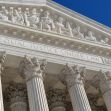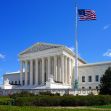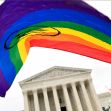There’s been a battle brewing in recent decades between proponents of anti-discrimination protections and advocates for ostensible religious freedoms. Religious organizations and religious parties claim they should have the freedom to operate businesses in line with their religious views, even if that means turning away customers or employees that have beliefs or lifestyles that conflict with their views. Civil rights activists argue that protections of so-called religious freedoms operate as an end-run around anti-discrimination laws. A number of employee rights cases have been working their way through the courts, clashing over the intersection between workplace anti-discrimination laws and religious protections. An ongoing case out of Washington State gave the Supreme Court the opportunity to once again address where the line should be drawn. The Court recently chose to deny cert on procedural grounds, but a concurring opinion suggests the justices are ready and waiting to tackle the issue head-on should a procedurally-appropriate case arise.
The case titled Seattle’s Union Gospel Mission v. Matthew Woods concerns the hiring practices of a religious nonprofit operating a free legal aid clinic. The Mission is overtly religious; as conditions for employment, the Mission explicitly requires regular church attendance, a referral from a pastor, and a statement from the applicant about their personal relationship with Jesus. The plaintiff, a former intern, applied for a position as a staff attorney with the clinic. During the interview process, the plaintiff disclosed that he was currently involved in a same-sex relationship. The director of the clinic informed the applicant that his sexual identity, as well as the fact that he did not attend church and could not provide a referral from a pastor, disqualified him from the position. He applied anyway and was rejected, after which he filed an employment discrimination lawsuit pursuant to Washington’s anti-discrimination laws.
The trial court dismissed the lawsuit based on the wording of Washington’s law, which explicitly excludes “any religious or sectarian organization not organized for private profit” from the definition of “employer.” The Washington Supreme Court reversed, finding that the law might violate the state’s constitution as applied to the plaintiff. Instead, the court suggested the law’s exemption must be restricted to situations in which the employee would be qualified as a “minister.” The case was remanded for further proceedings.
The “ministerial” exception has been the subject of much debate in state and federal courts around the country. The U.S. Supreme Court recognized the exception at least as early as 2012, finding that religious organizations can rely upon religious criteria to make employment decisions concerning ministers and other religious officials. The First Amendment guarantees religious organizations the right to operate in accordance with their faith, but the exception is limited to employees who serve an explicitly religious function.
The Court has not set a strict test as to what constitutes a minister. As recently as 2020, the Court ruled that the employee need not have a formal title or formal training (such as pastor or priest) to qualify as a minister. Employee rights groups and religious employers have fought over the scope of the ministerial exception in lower courts around the country, and at least some Supreme Court justices appear eager to weigh in once again.
The Court rescheduled the Mission’s petition for cert no less than seven times before the justices finally discussed the case at their private conference, suggesting that there was definite interest in taking up the matter. Ultimately, however, they denied cert because the case is still moving through the lower courts.
In an opinion concurring with the denial of cert, Justice Alito stated that the state supreme court’s opinion had laid the groundwork for an “inevitable” confrontation concerning whether employers have the constitutional right to hire as they please with regard to all positions. According to Justice Alito, the constitutional “guarantee of church autonomy” is not restricted to “employment decisions regarding formal ministers.” Indeed, “the day may soon come when we must decide whether the autonomy guaranteed by the First Amendment protects religious organizations’ freedom to hire co-religionists without state or judicial interference.” Justice Thomas joined in the concurrence.
If the majority of Supreme Court justices share Justice Alito’s viewpoint, the Court may very well be ready to throw out the ministerial exemption analysis entirely. Instead, the Court might hold that religious employers must be granted an unmitigated exemption from anti-discrimination laws, free to hire and fire any and all employees in accordance with their religious views. The implications, of course, go beyond merely evaluating someone based on whether they share the employer’s religious views. The Mission, for example, explicitly defines “homosexual behavior” as violative of their “religious lifestyle” requirements for employment; the Court’s concurrence implies that that requirement would be free from scrutiny under anti-discrimination laws, as would similar policies held by employers across the country. Should the Court take up the case, we may see a drastic change in the landscape for civil rights disputes inside and outside the employment context.






